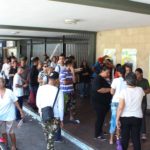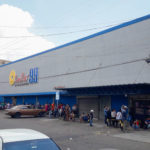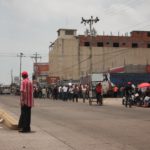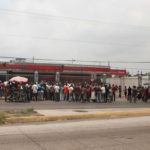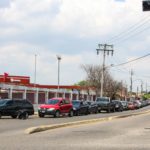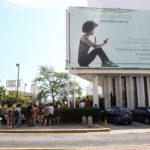The Ghost of Queues Returns to Haunt Maracuchos
Long lines are back. They never left entirely, but they did become a rare sight. After Maduro’s paquetazo, panicked citizens are buying everything they can. Food, medicine, gas and cash are scarce, but fear and anguish are not.


Photos and videos: Mario Pérez
“Oh God! The queues are back! But why? The products cost the same,” an aunt wondered near Maracaibo’s Centro 99, days after Nicolás Maduro’s controversial economic measures were announced, which among other things, include regulated prices for some basic food basket items and a 35-fold hike of the minimum wage.
New fixed prices have been announced for products such as rice, pasta or butter.
New fixed prices have been announced for products such as rice, pasta or butter which, curiously and magically reappeared in supermarket shelves, accompanied by a Bs.S. 600 “economic transition bonus” granted by the government through the carnet de la patria. Several citizens consulted by Radio Fe y Alegría said that they were indeed buying products with said bonus. In any case, long lines are back in Zulia’s capital.
Throughout the years, Venezuela has been recognized for baseball players and beauty queens. Now, it’s all about the long queues caused by shortages and misery left by 21st century socialism, imposed by Hugo Chávez and carried out by Maduro.
Gas service line, Maracaibo
Queues had gone down in Maracaibo in the last couple of months and they were seen only in stores which rarely sold regulated products. The shelves of small and large stores are solely filled with imported products from Colombia and Brazil, with prices far above those of national products and only available for citizens who make more than the minimum wage or receive money from people abroad.
But now, the dreaded long lines are back. They can be seen in any corner and, due to SUNDDE’s constant harassment, they will probably stay with us for an indefinite period of time. It’s still unclear whether authorities will sanction or jail shop owners selling imported products, which have already vanished in the first few days after the Madurazo, as panicked citizens buy everything they can.
The shelves of small and large stores are solely filled with imported products from Colombia and Brazil, with prices far above those of national products.
Lines for products are long, but queues for services seem endless. Gas stations, ATMs and banks are filled with people waiting due to the electric crisis. A co-worker tells me that he spends two to three hours a day in ATMs so he can withdraw Bs.S. 10 (ten bus fares). He says that he goes to the bank every day, because he can buy cheaper food in cash. Banks had been seeing heavy traffic when pensioners had to collect their payments, but now lines are getting longer, mainly because ATMs started dispensing Bs.S. 10 instead of Bs.S. 0,40. Now some citizens believe trading time of their day for more cash is a worthy sacrifice.
“Everything’s cheaper if you pay cash,” a lady told us when we were making the photoreport. In downtown Maracaibo, there’s a popular market called Las Pulgas, where people can buy food 50 times cheaper than in traditional shops… if they pay cash.
Zulia doesn’t escape from the cash shortages that threaten the entire country, but since it’s a border state, cash is frequently sold in Colombian currency exchange offices, where business is generally conducted by Venezuelans who send what they can to their relatives.
The new monetary cone’s banknotes can be bought for up to 900% their value.
The new monetary cone’s banknotes can be bought for up to 900% their value and, since the cone started circulating, dozens of people have been arrested for using more than one card when withdrawing money in ATMs.
The ghost of queues has come back to torment maracuchos, who are utterly helpless against communism. How long will they get before there is nothing left to buy?
Caracas Chronicles is 100% reader-supported.
We’ve been able to hang on for 22 years in one of the craziest media landscapes in the world. We’ve seen different media outlets in Venezuela (and abroad) closing shop, something we’re looking to avoid at all costs. Your collaboration goes a long way in helping us weather the storm.
Donate


